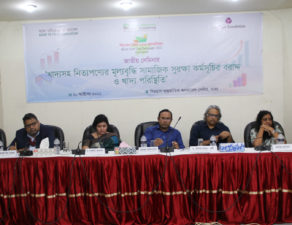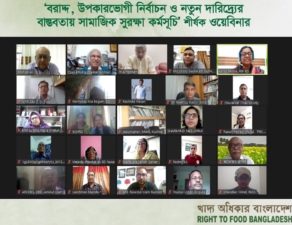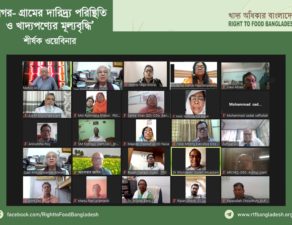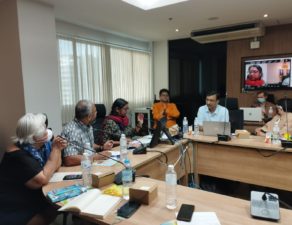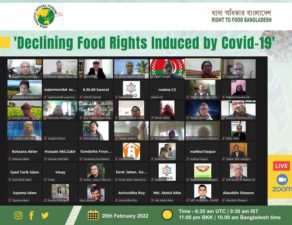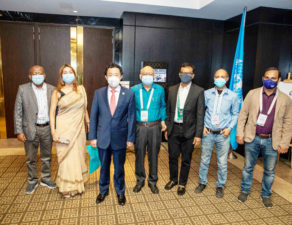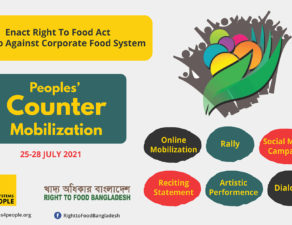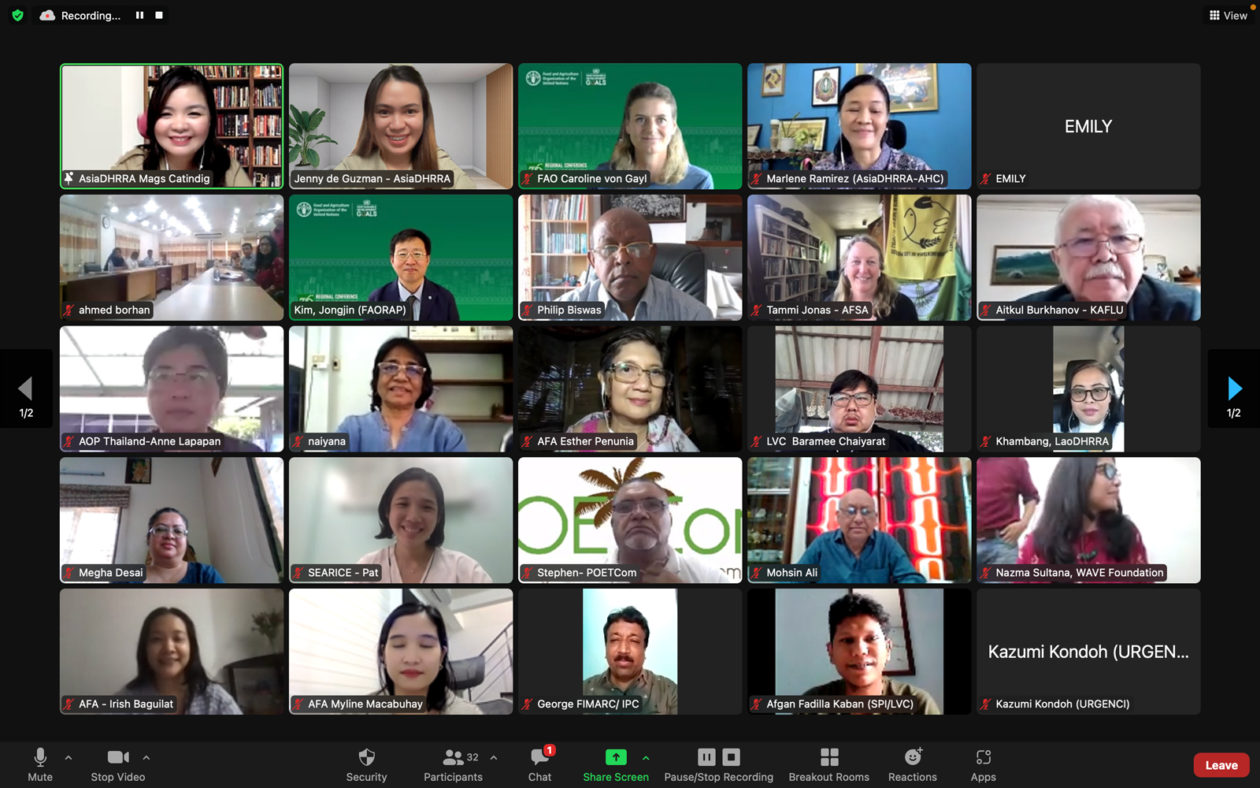
National CSO Consultation, in Preparation for the 36th FAO Regional Conference for Asia and the Pacific ,
2nd March 2022
Venue: YWCA, Dhaka
Mode : Hybrid
Right to Food Bangladesh including its member organizations participated in national CSO consultation as a part of preparation for the 36th FAO Regional Conference for Asia and the Pacific.
2nd March 2022.
One of the sessions and plenary discussions on ‘Promoting climate resilient agrifood systems in Bangladesh’ were moderated by Mohsin Ali General Secretary, Right to Food Bangladesh, where it was stated that there should be new policies for the marginalized household to buy foods. Some limitations were also mentioned during the discussion.
- Bangladesh faces a lot of natural calamities. Cyclones like Yash, Amphan, Bulbul destroy lots of crops and lives every year but there are not any sufficient governmental records for that to rectify the situation later.
- Because of the Covid-19 situation, Bangladesh has been suffering new economic losses, which are not being addressed by all.
Mohsin Ali concluded the second session.
In the session that focused the State of the Food and Agriculture (SOFA) in light of covid-19 in Bangladesh, one of the member organizations of RtF Bangldesh , BKF ASM Badrul Alam (BKF) responded in the session on behalf of CSO and stated that –
- the mainstream conception of food security is not correct ; it solely focuses on the food security of human being. Rather, it should consider the food for for all living beings along with human being
- Pavel added that due to the pandemic people lost their jobs, went back to the village and contributed to agriculture and entrepreneurship. Some people were harassed by the fraudulent online business. He mentioned about the natural disaster that intensified the food insecurity of the poor people
- Badrul Alam mentioned that agriculture should be the major weapon to ensure food security. However he showed his concern that excess production of food will lead to farmers to lose, and agricultural diversity is being reduced. He also mentioned that the hybridization in agriculture will lead to damage to the ecosystem. He emphasized on eco-friendly agricultural systems.
- the marginalized farmers get the least amount of service and facilities. The amount of help they get from the government and the private sectors and NGOs is significantly lower than the farmers who are in a better position than them.
Farmers are not getting the wedges they need to get.
The session on ‘empowering smallholders through building strong producers organizations’ was moderated by Philip Biswas , Founder Executive Director of Rural Reconstruction Foundation (one of the member organizations of RtF) & FIMARC. He underscored the importance of empowering small-scale food producers through strengthening farmers’ or producers organizations.
Shamsunnahar Khan Dolly , president Bangladesh Kishani Sabha (BKS), responded to the session on behalf of RtF Bangladesh and articulated their experience of agricultural activities.
The session on ‘Agroecological perspective from the viewpoint of small scale food producers’ was conducted by Nurul Alam Masud from Khani Bangladesh, one of the member organizations of RtF Bangladesh .
Nazma Sultana, Assistant director, Wave Foundation secretariat of RtF Bangladesh presented Digitalization and mechanization in agriculture focusing on the Bangladesh context. She showed her concern on the significant cost and the low buying intensity of farmers, information gap/lack of user-friendly ICT services, policy gap and lack of proper execution, skill and access. She also focused on limitations around using smart phone, internet and generally are unwilling to pay for digital services, inadequate support from the government, banks and private organizations/project based support, gender gap in access and control over technologies and so on.
In the his session on promoting climate-resilient agri-food systems in Bangladesh Helal Uddin from SID Foundation, member of RtF Bangladesh talked about the agroecological perspective from the viewpoint of small-scale food. He raised some points on –
- How food security should be the main agenda of the country.
- Which ingredient is there in the country most sufficiently and which one is consumed the most.
- Safety should be addressed with utmost importance. Cadmium in rice or antibiotics in fish production should not be taken lightly.
- Processed foods and their harmfulness.
- Climate-neutral agriculture.
- Full package hybrid crops have no long-term benefits.
- How to monitor the project –
- Humane approach.
- Inclusiveness
- Includes everyone and everything.
RtF BD Finance Secretary Amit Ranjan Dey and Amirul Islam (AFA) member of RtF responded in this discussion. Amit Ranjan Ray pointed talked about the green revolution. He pointed out some issues like –
- How it should be addressed as green/blue evolution and not green/ blue revolution.
- How the green revolution made negative impacts on everything.
- IPCC (2021) greenhouse gas emission from agriculture
- Women and agriculture.
- How many poor people are included in ecological development?
- Limitations of the green revolution.
- The solution from the experts.
Amirul Islam raised some issues as well through Zoom –
- Challenges for agroecology.
- Promoting agroecology.
- How food varieties have been reduced because of the green revolution.
- How food nutrients are being affected.
- There should be an organized farmers to raise their voices collectively
- Farmers association to negotiate with the government.
Suggestions from National CSOs:
- Like India, Bangladesh should have a small farmer-friendly policy to make their lives better.
- The policies should not stay in the documents only, rather we need to check whether the implementation is going well in reality or not.
- The food and agriculture sector should be researched from philosophical and humanitarian points of view.
- Laws and policies should be yeomanry/small scale food producers
- The government should take necessary steps to digitalize the farmer’s database to make them technologically efficient.
- The government needs to be pressurized to create laws for the welfare of the farmers.
- Making sure that there is more access t of the farmers in the financial .
- Unite all the farmers through the governmental agricultural department. The sub associate officers should be assigned for these tasks. The marginalized farmers need to have a certain amount of pension from the government and the gender ratio of the farmers should be at least 60:40.
- Include the rights of food law in the parliament.
- Reviewing policies and implementing them.
- Genetically modified crops actually minimize the nutritional value of foods. The government should come up with alternative ideas for it.
- Hybridization can bring huge losses to the farmers. In order to rectify the situation, the government should come up with alternative ideas to lessen the loss.


